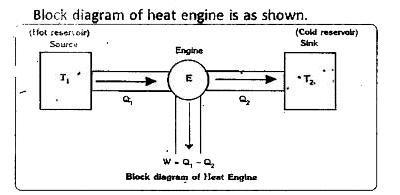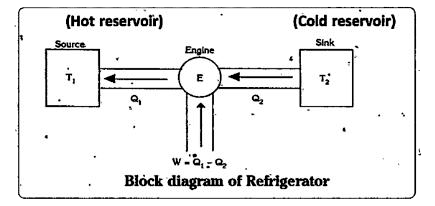State Second law of Thermodynamics. How is heat engine different from a refrigerator?
Text Solution
Second Law of Thermodynamics : First law of thermodynamics. is based on Law of conservation of energy, while second law of thermodynamics gives information about the transformation of heat energy. There are two conventional statements of second law depending on common experience.
1) Kelvin- Plank statement: It is impossible for an engine working in a cyclic process to extract heat from a hot body and to convert it completely into work. In other words 100% conversion of heat into work is impossible.
2) Clausius Statement: It is impossible for a self acting machine, unailded by any external agency to transfer heat from a cold body to a hot reservoir. In other words heat cannot by itself flow from a colder body to a hotter body.
Both statements are identical : Suppose a heat engine absorbs heat from a hot body, converts a part of it into work and rejects the rest of heat to a body at lower temperature. When temperatures of both become equal, flow of heat stops and the engine stops working.
Heat engine : A heat engine is a device used to convert heat. energy into mechanical work.
Generally heat engines will work in a cyclic process. Heat engine consists of three important units.
1) Source: Which is an object or .system at high temperature. A heat engine will absorb heat energyQ1 from source.
2) Working substance : Every heat engine requires a working substance to do work. Generally the working substance is - like steam or fuel vapour and air mixture etc. A part of heat energy of working substance is converted into mechanical work.
3) Sink : In every heat engine heat energy content of working substance is not converted into work totally. So some en ergy (Q2) is wasted or rejected by the engine. This rejected energy(Q2) is delivered to some other body or system at low temperature. This body with low temperature is called sink .
Efficiency of heat engine ,η=Work done Heat energy supplied =WQ1
(But W=Q1−Q2)
(or) η=WQ1=Q1−Q2Q1⇒η=1−Q2Q1 where
Q1 = heat energy supplied by source
Q2 = heat energy delivered to sink

Refrigerator : A refrigerator works in the reverse process of heat engine. It extracts heat energy Q2 from sink i.e., from low temperature body with the help of external work and delivers Heat energy Q2 to high temperature body called source.
Work done w=Q1−Q2 In refrigerators external work is done one working substance
A block diagram of refrigerator is as shown

Differences between heat engine and refrigerator : Refrigerator extracts heat energy from sink i.e., from low tem- perature body with the help of external work and delivers heat energy to high temperature body called source.
A heat engine will absorb heat energy from source and reject heat.energy to the sink. Heat engine, will work in a reversible process but the refrigerator works in the reverse process of heat engine.
|
Topper's Solved these Questions
- MODEL PAPER 9BOOK - VGS PUBLICATION-BRILLIANTCHAPTER - MODEL PAPER 9EXERCISE - Section - B
8 Videos
- MODEL PAPER 8BOOK - VGS PUBLICATION-BRILLIANTCHAPTER - MODEL PAPER 8EXERCISE - SECTION - C
3 Videos
- MOTION IN STRAIGHT LINE BOOK - VGS PUBLICATION-BRILLIANTCHAPTER - MOTION IN STRAIGHT LINE EXERCISE - PROBLEMS
16 Videos
Similar Questions
Knowledge Check
the second law of thermodynamics states that
Ain any spontaneous process entropy of the universe always increasesBenergy can neither be created nor be destroyedCenergy of the universe remains constantDDeltaS_universelt0 for a spontaneous reactionThe second law of thermodynamics states that
Aall spontaneous processes are thermodynamically irreversibleBentropy of the universe is continuously increasingCenergy can neither be created nor destroyedDenergy of the universe remain constant.According to second law of thermodynamics
AΔStotal=+veBΔStotal=−veCΔSsystem=+veDΔSsystem=−ve
